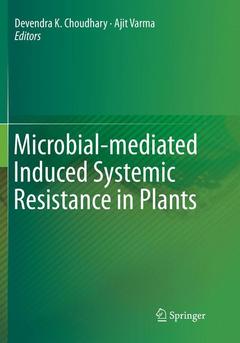Description
Microbial-mediated Induced Systemic Resistance in Plants, Softcover reprint of the original 1st ed. 2016
Coordinators: Choudhary Devendra K., Varma Ajit
Language: English
Subjects for Microbial-mediated Induced Systemic Resistance in Plants:
Publication date: 04-2018
Support: Print on demand
Publication date: 03-2016
226 p. · 17.8x25.4 cm · Hardback
Description
/li>Contents
/li>Biography
/li>Comment
/li>
With a focus on food safety, this book highlights the importance of microbes in sustainable agriculture. Plants, sessile organisms that are considered as primary producers in the ecosystem and communicate with above- and below-ground communities that consist of microbes, insects, and other vertebrate and invertebrate animals, are subjected to various kinds of stress. Broadly speaking, these can be subdivided into abiotic and biotic stresses. Plants have evolved to develop elaborate mechanisms for coping with and adapting to the environmental stresses.
Among other stresses, habitat-imposed biotic stress is one serious condition causing major problems for crop productivity. Most plants employ plant-growth-promoting microorganisms (PGPMs) to combat and protect themselves from stresses and also for better growth.
PGPMs are bacteria associated with plant roots and they augment plant productivity and immunity. They are also defined as root-colonizing bacteria that have beneficial effects on plant growth and development. Remarkably, PGPMs including mycorrhizae, rhizobia, and rhizobacteria (Acinetobacter, Agrobacterium, Arthrobacter, Azospirillum, Bacillus, Bradyrhizobium, Frankia, Pseudomonas, Rhizobium, Serratia, Thiobacillus) form associations with plant roots and can promote plant growth by increasing plants? access to soil minerals and protecting them against pathogens.
To combat the pathogens causing different diseases and other biotic stresses, PGPMs produce a higher level of resistance in addition to plants? indigenous immune systems in the form of induced systemic resistance (ISR).
The ISR elicited by PGPMs has suppressed plant diseases caused by a range of pathogens in both the greenhouse and field. As such, the role of these microbes can no longer be ignored for sustainable agriculture.
Today, PGPMs are also utilized in the form of bio-fertilizers to increase plant productivity. However, the use of PGPMs requires a precise understanding of the interactions between plants and microbes, between microbes and microbiota, and how biotic factors influence these relationships. Consequently, continued research is needed to develop new approaches to boost the efficiency of PGPMs and to understand the ecological, genetic and biochemical relationships in their habitat.
The book focuses on recent research concerning interactions between PGPMs and plants under biotic stress. It addresses key concerns such as ?
1. The response of benign microbes that benefit plants under biotic stress
2. The physiological changes incurred in plants under harsh conditions3. The role of microbial determinants in promoting plant growth under biotic stress
The book focuses on a range of aspects related to PGPMs such as their mode of action, priming of plant defence and plant growth in disease challenged crops, multifunctional bio-fertilizers, PGPM-mediated disease suppression, and the effect of PGPMs on secondary metabolites etc.
The book will be a valuable asset to researchers and professionals working in the area of microbial-mediated support of plants under biotic stress.
Dr. Devendra K. Choudhary
Dr. Choudhary has over fourteen years of experience in Microbial Ecology and is currently working as an Assistant Professor-Grade III at Amity University, Noida. Before joining Amity University, Dr. Choudhary spent several years at Mody University, Lakshmangarh, as an Assistant Professor, preceded by work at Peoples and Barkatullah University, Bhopal as a Lecturer cum scientist.
Dr. Choudhary received his PhD in Microbiology in 2005 from GB Pant University of Agriculture & Technology, Pantnagar, after having received his MSc in Microbiology from MDS University, Ajmer and qualifying CSIR-UGC-NET in 2002.
Dr. Choudhary has worked on GOI sponsored major projects as Principle Investigator (PI). Recently he worked on the DST FAST-TRACK project at the Department of Biotechnology, Barkatullah University, Bhopal, along with two major projects by DBT and SERB, at Amity University until the year 2015.
As an active researcher, Dr Choudhary has published research and review articles along with several book chapters for reputed journals and edited books. In addition, he has served as PhD supervisor/co-supervisor for several research scholars. Dr Choudhary is a recipient of the Indian National Science Academy (INSA) visiting and summer research fellowship 2014.
Further, one of his PhD students received the 2013 Dr RS Rana Memorial best research award, sponsored by the Association of Microbiologists of India. Under supervision of Dr Choudhary his scientific team has assigned two accession numbers from MTCC, IMTECH for submitted bacterial cultures (MTCC, 12057 & 12058) along with one MCC no 2607. Most recently, his team has filed three patents with the India Patent Office, New Delhi and others are in progress.
Prof. Dr. Ajit Varma
Dr. Varma completed his M.Sc. (1959) & Ph.D. (1964) degrees at Allahabad University, Allahabad,Comprehensive account of plant microbe interaction and their response to systemic and induced resistance
Elucidates self explanatory illustrations for transporter-mediated microbe-plant interactions
Emphasizes biotechnological perspectives of microbes in sustainable agriculture
Demonstrates role of microbes in food security
These books may interest you

Microbial Inoculants in Sustainable Agricultural ProductivityVol. 2: Functional Applications 232.09 €



